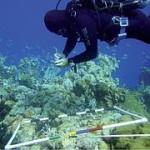The study provides information on incorporating resilience information and climate change responses into Marine Protected Area (MPA) design and management, especially given the recent bleaching event that occurred in 2010-2011.
 26 April 2011: The International Union for Conservation of Nature (IUCN) has published a study, based on surveys conducted in 2009 as part of the IUCN Climate Change and Coral Reefs Working Group global coral reef resilience assessments, on resilience characteristics of the coral reefs in the Bonaire National Marine Park.
26 April 2011: The International Union for Conservation of Nature (IUCN) has published a study, based on surveys conducted in 2009 as part of the IUCN Climate Change and Coral Reefs Working Group global coral reef resilience assessments, on resilience characteristics of the coral reefs in the Bonaire National Marine Park.
The aim of the study is to provide information on incorporating resilience information and climate change responses into Marine Protected Area (MPA) design and management, especially given the recent bleaching event that occurred in 2010-2011.
The study highlights threats to Bonaire’s coral reefs, including coastal development and artificial beaches, sewage leaching from septic tanks, increasing populations of damselfish that destroy coral, as well as animals and algae such as the Trididemnum and the Lobophora that grow over and out-compete corals. The study argues that these threats could have serious implications for resilience to future climate change and other threats.
The study notes that, since Bonaire heavily depends on tourism with coral reefs as the major attraction, their health and attractiveness can directly influence the island’s economy. [IUCN News] [Publication: Coral Reef Resilience Assessment of the Bonaire National Marine Park, Netherlands Antilles]